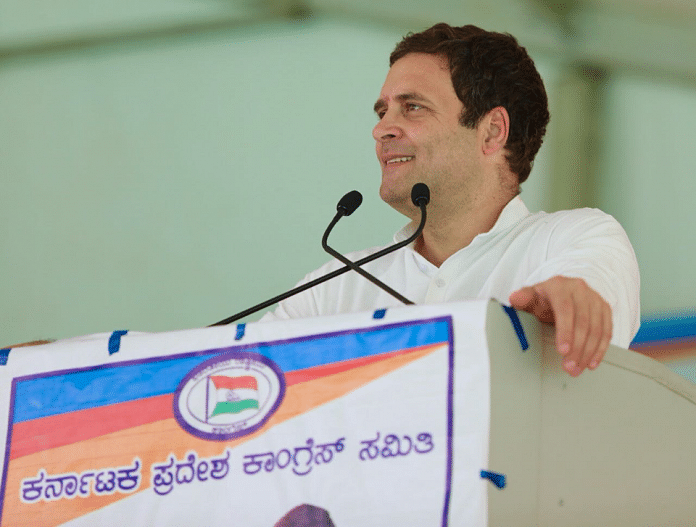Some in the Congress party ask why the voters in Karnataka have to choose between various flavours of Hindu identity.
The Congress is playing the soft Hindutva card for the upcoming Karnataka polls to counter the BJP’s hard Hindutva line.
The grand old party found that its plank of ‘communalism versus secularism’ was not working any more, and has consciously decided to play majoritarian politics. It is emboldened by its improvement in the recent Gujarat assembly polls, where it stopped the BJP from winning more than 99 seats.
Congress president Rahul Gandhi visited 27 temples during his Gujarat campaign, and won 18 seats of the constituencies where they were located. He saw the wisdom in accepting the Antony Committee’s internal probe into the party’s Lok Sabha rout in 2014. The report found that ‘secularism-versus-communalism’ plank had hurt the Congress.
The stakes are high for both the BJP and the Congress in Karnataka. Losing the state would mean the disappearance of the Congress south of the Vindhyas, while winning Karnataka would mean regaining a lost foothold in the south for the BJP.
The Karnataka results could also have a cascading effect in other poll-bound states like Rajasthan, Madhya Pradesh and Chhattisgarh, where elections are scheduled later in the year. The Congress wants to snatch these three BJP-ruled states and plans to use the soft Hindutva plank in these states too.
Last year, the Supreme Court ruled that “no politician can seek votes in the name of caste, creed or religion”, and that the election process must be a “secular exercise”. The court held that elections would be void if a politician made an appeal for votes on the basis of religious sentiment. However, not many seem to have paid heed to that in most assembly polls.
In the past few months, Congress leaders have been assiduously trying to woo Hindus. Rahul himself is being promoted as ‘janeudhari’ (sacred thread-wearing) Brahmin, touting his great-grandfather Jawaharlal Nehru’s roots. He has been sporting tilak and rudraksha beads when he goes to temples, and has proclaimed himself a bhakt of Lord Shiva.
Interestingly, the soft Hindutva plank is not new to the Congress — it has moved from Nehru’s pluralism to Indira Gandhi’s soft Hindutva. Her son Rajiv Gandhi played it both ways and lost. While opening the locks of the disputed Ram Mandir/Babri Masjid site in Ayodhya before the 1989 polls and announcing that he would bring ‘Ram Rajya’, Rajiv also played appeasement politics in the Shah Bano case. When she took over the party, Sonia Gandhi tilted towards minority appeasement.
Until last year, Rahul had not made up his mind, but the Gujarat poll results have convinced him that soft Hindutva might pay electoral dividends after his temple-hopping. Rahul’s Congress has taken a middle ground to change the perception that it is pro-minority, and is cleverly trying to make a distinction between Hindutva and the Hindus.
His temple run, so far, has included Huligamma Temple, Gavisiddeshwara Mutt, Anubhava Mantapa and the Sringeri Mutt, besides the important Lingayat mutt. To balance it, he also visited the Sufi shrine of Khwaja Bande, the Rozario Church and the Ullal Dargah.
Interestingly, at least a dozen seers have approached the three big parties for tickets. The Shiroor seer is even planning to enter the fray as an independent if denied a ticket.
So, will the Congress strategy work in Karnataka?
The party fears that nearer the polls, the BJP might try to polarise the atmosphere, while accusing the Congress of doing the same. Rahul has told his party leaders in closed-door meetings that they should desist from making any controversial statements or projecting themselves as anti-Hindu. He has cautioned chief minister Siddaramaiah about branding Hindu outfits as ‘terrorists’.
Rahul has also given a free hand to Siddaramaiah. He belongs to the Kurubas, the third largest community in Karnataka with a lot of influence. He is countering the BJP’s Hindutva plank by asserting “Are BJP leaders the only Hindus? Are we not Hindus too? Has the BJP taken up a contract for Hindutva? We are also Hindus but we respect all religions. That is our culture and that is true Hindutva.”
The chief minister, by providing a separate religious status to the powerful Lingayats, the followers of the 12th century reformer Basavanna, has also driven a stake between the Lingayats and the Veerashaivas, who are now fighting among themselves. The Lingayats have influence in at least 100 constituencies. The BJP’s chief ministerial candidate, B.S. Yeddyurappa is also a Lingayat. Siddaramaiah is depending on his “Ahinda”(Kannada acronym for minorities, backward classes and Dalits) politics to win polls.
Interestingly, not everyone in the Congress is in favour of this soft Hindutva line. Some senior leaders fear that in states where the contest is multipolar, the voters might root for a third alternative. Some in the party also ask why the voters have to choose between various flavours of Hindu identity.
But ultimately, the main target for the Congress is to win back the Hindus, whichever route it takes.



